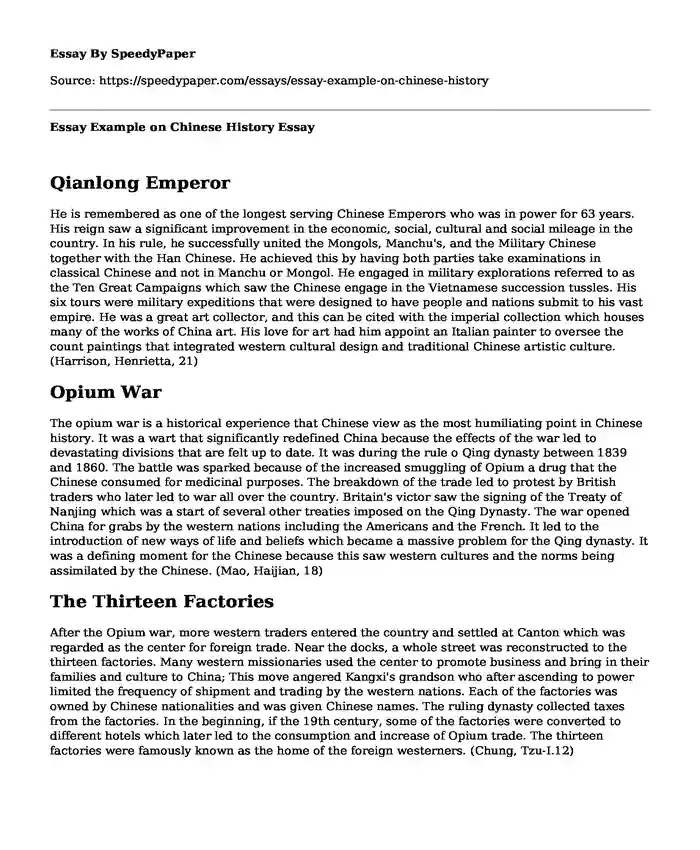Qianlong Emperor
He is remembered as one of the longest serving Chinese Emperors who was in power for 63 years. His reign saw a significant improvement in the economic, social, cultural and social mileage in the country. In his rule, he successfully united the Mongols, Manchu's, and the Military Chinese together with the Han Chinese. He achieved this by having both parties take examinations in classical Chinese and not in Manchu or Mongol. He engaged in military explorations referred to as the Ten Great Campaigns which saw the Chinese engage in the Vietnamese succession tussles. His six tours were military expeditions that were designed to have people and nations submit to his vast empire. He was a great art collector, and this can be cited with the imperial collection which houses many of the works of China art. His love for art had him appoint an Italian painter to oversee the count paintings that integrated western cultural design and traditional Chinese artistic culture. (Harrison, Henrietta, 21)
Opium War
The opium war is a historical experience that Chinese view as the most humiliating point in Chinese history. It was a wart that significantly redefined China because the effects of the war led to devastating divisions that are felt up to date. It was during the rule o Qing dynasty between 1839 and 1860. The battle was sparked because of the increased smuggling of Opium a drug that the Chinese consumed for medicinal purposes. The breakdown of the trade led to protest by British traders who later led to war all over the country. Britain's victor saw the signing of the Treaty of Nanjing which was a start of several other treaties imposed on the Qing Dynasty. The war opened China for grabs by the western nations including the Americans and the French. It led to the introduction of new ways of life and beliefs which became a massive problem for the Qing dynasty. It was a defining moment for the Chinese because this saw western cultures and the norms being assimilated by the Chinese. (Mao, Haijian, 18)
The Thirteen Factories
After the Opium war, more western traders entered the country and settled at Canton which was regarded as the center for foreign trade. Near the docks, a whole street was reconstructed to the thirteen factories. Many western missionaries used the center to promote business and bring in their families and culture to China; This move angered Kangxi's grandson who after ascending to power limited the frequency of shipment and trading by the western nations. Each of the factories was owned by Chinese nationalities and was given Chinese names. The ruling dynasty collected taxes from the factories. In the beginning, if the 19th century, some of the factories were converted to different hotels which later led to the consumption and increase of Opium trade. The thirteen factories were famously known as the home of the foreign westerners. (Chung, Tzu-I.12)
Lin Zexu
He was a Chinese official who had a significant impact in a group of scholars and officials whose slogan was "finding in antiquity the sanction for present-day reform." He was part of the "statecraft school" that compiled information that was applied in the governing of many topics including knowledge on the history of countries and geography. His involvement in the opium war saw a further increase in free trade which opened doors for more foreigners who "humiliated" the Chinese culture. He acted as the catalyst of the opium war because of his aggressive tone towards the western people only insulted their government which later sparked the Opium war. He was a great scholar during the Qing dynasty and a hardworking official commissioner who had a significant impact on the Opium war. (Rotrosen, John.18)
The Boxer Rebellion
It was a secret Chinese group that was up against the increased spread of the western influence in the country and also the impact of the Japanese. They performed physical exercise which they thought would prevent them from bullets. The uprising in 1900 led to the killing of missionaries and burning of Christian properties as a move against them in the influence of the western societies in the country. They successfully took over Beijing which saw the intervention of the American troops which ousted them. The aftermath of the rebellion saw the Chinese government pay $300 million for reparations and a 2-year ban for the importation of firearms. The uprising led to the death of hundreds of foreigners and thousands of Chinese Christians. (Smith, Rohan, 7)
Works Cited
Chung, Tzu-I. "Kwong Lee & Company and Early Trans-Pacific Trade: From Canton, Hong Kong, to Victoria and Barkerville." BC Studies: The British Columbian Quarterly 185 (2015): 137-160.
Harrison, Henrietta. "The Qianlong Emperor's Letter to George III and the Early-Twentieth-Century Origins of Ideas about Traditional China's Foreign RelationsThe Qianlong Emperor's Letter to George III." The American Historical Review 122.3 (2017): 680-701.
Mao, Haijian. The Qing Empire and the Opium War. Cambridge University Press, 2016.
Rotrosen, John. "Where's Our Lin Zexu? A Call for Leadership and Resources to Address the Opioid Epidemic." (2018): 495-497.
Smith, Rohan. "Stage 5 depth study 2: Asia, topic 2b, and the world (1750-1918) the Boxer Rebellion." Teaching History 51.2 (2017): 68.
Cite this page
Essay Example on Chinese History. (2023, Jan 03). Retrieved from https://speedypaper.net/essays/essay-example-on-chinese-history
Request Removal
If you are the original author of this essay and no longer wish to have it published on the SpeedyPaper website, please click below to request its removal:
- How Does the Dabbawala System Work? Free Essay Sample
- Free Essay on Creditor Rights in Sovereign Debt Markets
- Process Analysis Essay About Fitness, Free Example
- Democracy Essay Sample
- Law Essay Example: Alternative Legal Venues
- Free Paper on the Territorial Disputes on the South China Sea
- Free Essay on The Origin of The Earth
Popular categories





